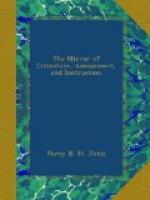by digging through the wall that separated them, to
form an extensive mine under the foundations.
A house was also hired in Lambeth, to serve as a depository
for the powder, and Mr. Keys, who was then admitted
as one of the number, was placed in charge. The
whole party then dispersed, and agreed to meet again
at Michaelmas. At Michaelmas it was resolved that
the time was arrived when they should commence working
at their mine; but various causes hindered them from
beginning, till within a fortnight of Christmas.
The party, at that time, consisting of five, then entered
upon their work; and, having first provided themselves
with baked meat that they might not have occasion
to leave the house, they worked incessantly till Christmas
Eve, underpropping the walls, as they proceeded, with
wood. A little before Christmas, Christopher
Wright was added to the number; and, finding their
work to be extremely laborious, the walls being upwards
of three yards in thickness, they afterwards admitted
Robert Wintour to assist them. Taking advantage
of the long and dreary nights between Christmas and
Candlemas, they then brought their powder over from
Lambeth in a boat and lodged it in Percy’s house,
and afterwards continued to labour at the mine.
In the Easter following (1605) as they were at their
work, the whole party were dreadfully alarmed on hearing
a rushing noise near them; but on inquiry they found
no danger menaced them, but that it proceeded from
the removal of some coals in an adjoining vault, under
the Parliament House. Nothing could be more propitious
for the conspirators; and, ascertaining that it belonged
to the same parties of whom they held the house, but
in the possession of a man of the name of Skinner,
they lost no time in purchasing the good-will of Skinner,
and eventually hired the vault of Whinniard, at the
rate of four pounds per annum. Abandoning their
original intention of forming a mine under the walls,
they placed the powder in this vault, and afterwards
gradually conveyed into it three thousand billets of
wood, and five hundred fagots; Guy Fawkes arranging
them in order, making the place clean and neat, in
order that if any strangers, by accident or otherwise,
entered the house, no suspicion might be excited.
Fawkes then went into Flanders to inform Sir W. Stanley
and Mr. Owen of their progress, and returned in the
following August. Catesby, meeting Percy at Bath,
proposed that himself should have authority to call
in whom he pleased, as at that time they were but
few in number, and were very short of money.
This being acceded to, he imparted the design to Sir
Everard Digby, Francis Tresam, Ambrose Rookewood,
and John Grant. Digby promised to subscribe one
thousand five hundred pounds, and Tresam two thousand
pounds. Percy engaged to procure all he could
of the Duke of Northumberland’s rents, which
would amount to about four thousand pounds, and to
furnish ten good horses.
Thus far, every thing had prospered with the conspirators; success had followed every effort they had made.




